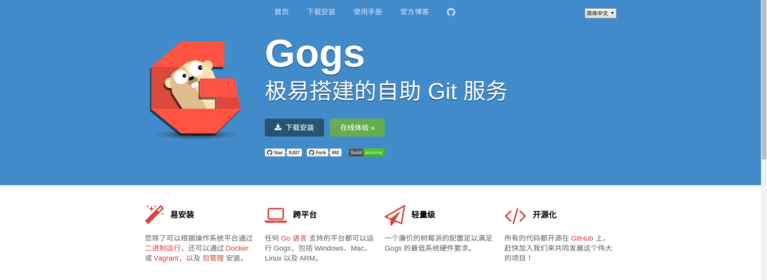I recently discovered a very interesting piece of Free Software: Gogs[1].
It is a github clone for developers who prefer to self-host their source code rather than hand it over to proprietary GitHub service and give away their privacy. Gogs is the best example I know of Free Software made by Chinese developers: it is original, it uses a modern architecture based on Golang and recent JavaScript frameworks, it is designed to be international, it tries to create a community and it does not try to push some kind of commercial proprietary version. It is still not as mature as open source equivalents such as GitLab. But its lightweight design is very promising. As soon as it supports pull-request and code review, I will drop the instance of GitLab that I use for self hosting my projects.

Gogs (http://gogs.io/)
There are many other examples Free Software projects in China. Here is my own list.
The first example I can remember is WD Calendar [2]. It was later extended by Sigma Widgets [3] into a full JavaScript user interface framework [4] that was used by a major Chinese airline company for its business applications. It was released with a true Free Software business model: those who take the yearly subscription get the guarantee that the bugs they report will be fixed [5]. Fair and Free. But very sadly, this business model was abandonned and the LGPL visual AJAX builder [6] is now no longer Free Software.
J-UI[7] is another Chinese Free JavaScript framework. It is entirely based on jQuery and has used social networks to build a community. But probably due to its documentation available only in Chinese, it did not get much audience outside China.
ssdb [8] is a NoSQL database that combines Reddis API and LevelDB storage. It is not quite as original as Gogs or CrossUI since it combines two existing open source projects. Yet, it could create its own community and gather many industrial users inside China, but not much outside.
Taobao themselves contributed to MariaDB database the multi-master replication features. You can find in MariaDB release notes acknowledgements to Lixun Peng for this major contribution [9]. Alibaba has also a page dedicated to all its open source activities [10].
I also recently discovered Zentao [11], an open source project management application that – sadly – relies on a Premium business model: what is sold to users is a proprietary version of the application whereas the open source version has no official commercial support. Yet, this demonstrates growing adoption of open source business applications in China.
There are also many developers of open source plugins for Chinese cloud services such as Qiniu. Klion Xu has published for example a Qiniu plugin for the ghost blogging platform [12]. It may not be a full application but it is the sign that a new generation of young developers are ready to create further Free Software in China.
This list is only the beginning. Let us hope it will extend quickly. Please feel free to contact me jp@nexedi.com with more projects to talk about. I will make sure I write about them in my next blog.
References
[1] Gogs - http://gogs.io/
[2] wd-calendar - http://www.web-delicious.com/jquery-event-calendar/
[3] Sigma Widgets - http://www.sigmawidgets.com/
[4] CrossUI - https://code.google.com/p/crossui/
[5] Sigma Widgets Commercial License - http://www.sigmawidgets.com/buy_now.html
[6] Sigma Visual Ajax Builder - https://code.google.com/p/linb/
[7] J-UI - http://j-ui.com/
[8] SSDB - http://ssdb.io/
[9] MariaDB contributors - https://mariadb.com/kb/en/mariadb/log-of-mariadb-contributions/
[10] Alibaba Open Source - http://alibaba.github.io/
[11] zentao - http://www.zentao.net/
[12] ghost-qiniu - https://github.com/sanddudu/ghost-qiniu